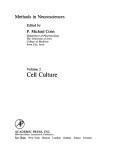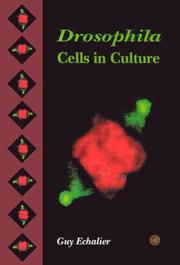| Listing 1 - 10 of 17 | << page >> |
Sort by
|

ISBN: 0121852547 1483262189 9780121852535 0121852539 9780121852542 Year: 1990 Volume: 2 Publisher: San Diego (Calif.): Academic press,
Abstract | Keywords | Export | Availability | Bookmark
 Loading...
Loading...Choose an application
- Reference Manager
- EndNote
- RefWorks (Direct export to RefWorks)
Cell Culture
Biological techniques --- Zoohistology. Zoocytology --- CYTOLOGICAL TECHNIQUES --- CELLS, CULTURED --- Cell culture --- Biochemical engineering --- Biotechnology

ISBN: 9780122294600 0122294602 9780080530536 0080530532 1281032816 9781281032812 9786611032814 0128097043 Year: 1997 Publisher: San Diego : Academic Press,
Abstract | Keywords | Export | Availability | Bookmark
 Loading...
Loading...Choose an application
- Reference Manager
- EndNote
- RefWorks (Direct export to RefWorks)
Currently Drosophila is a dominant experimental model in developmental biology and in gene regulation in eukaryotes. This volume summarizes some thirty years of experience in the handling of in vitro cultured Drosophila cells. Its main emphasis is on gene transfer methodology, cell responses to heat shock, hormonal regulation of genes, and on the expression and mobility of transposable elements.Key Features* Some thirty years of experience in handling in vitro cultured Drosophila cells* Cell cultures which provide material for a multiplicity o
Histology. Cytology --- Biochemical genetics. --- Drosophila --- Cytology --- Technique. --- Cell Culture Techniques. --- Cells, Cultured. --- cytology. --- ELSEVIER-B EPUB-LIV-FT

ISBN: 9780122219702 0122219708 9781435604988 1435604989 0080535445 9780080535449 1281054178 9781281054173 9786611054175 Year: 2001 Publisher: San Diego, Calif. ; London : Academic,
Abstract | Keywords | Export | Availability | Bookmark
 Loading...
Loading...Choose an application
- Reference Manager
- EndNote
- RefWorks (Direct export to RefWorks)
This book represents an essential reference manual for all of the well-characterized leukemia-lymphoma cell lines currently available. It provides the most important facts, using the succinct and user-friendly format that has made the FactsBooks so popular with scientists and clinical researchers. Introductory chapters provide background and perspective for culturing malignant hematopoietic (blood forming) cell lines. These chapters are followed by over 400 comprehensive individual entries. Each cell line entry highlights essential clinical, immunological, genetic, and functional featur
Human histology. Human cytology --- Human medicine --- Cancer cells. --- Cell Line. --- Cell lines. --- Hematologic Neoplasms. --- Hematopoietic stem cells. --- Human cell culture. --- Leukemia. --- Leukemia, Experimental. --- Leukemia, Experimental--Handbooks, manuals, etc. Lymphomas--Handbooks, manuals, etc. Cancer cells--Handbooks, manuals, etc. Human cell culture--Handbooks, manuals, etc. Hematopoietic stem cells--Handb. --- Lymphoma. --- Lymphomas. --- Research. --- Tumor Cells, Cultured. --- Neoplasms by Histologic Type --- Lymphoproliferative Disorders --- Cells, Cultured --- Culture Techniques --- Neoplasms --- Lymphatic Diseases --- Cells --- Clinical Laboratory Techniques --- Immunoproliferative Disorders --- Anatomy --- Diseases --- Investigative Techniques --- Immune System Diseases --- Hemic and Lymphatic Diseases --- Cell Culture Techniques --- Leukemia --- Lymphoma --- Tumor Cells, Cultured --- Medicine --- Health & Biological Sciences --- Hematologic Diseases --- Lymphomas --- Cell lines --- Cancer cells
Periodical
ISSN: 15730603 13815741 Year: 2004 Publisher: Dordrecht : Kluwer Academic Publishers,
Abstract | Keywords | Export | Availability | Bookmark
 Loading...
Loading...Choose an application
- Reference Manager
- EndNote
- RefWorks (Direct export to RefWorks)
Cell culture --- Tissue culture --- Biotechnology --- Cells, Cultured --- Cytological Techniques --- Technique --- Cellules --- Tissus (Histologie) --- Culture --- Tissues --- Cultures and culture media --- Technique. --- Cultures (Biology) --- Organ culture --- Cytology --- Life Sciences --- Biology --- Cytology, Cell Biology --- Micro and Molecular Biology
Book
ISBN: 1402096453 9786612824692 1282824694 1402096461 Year: 2009 Publisher: Dordrecht ; London : Springer,
Abstract | Keywords | Export | Availability | Bookmark
 Loading...
Loading...Choose an application
- Reference Manager
- EndNote
- RefWorks (Direct export to RefWorks)
Animal cell technology is a growing discipline of cell biology which aims not only to understand structures, functions and behaviors of differentiated animal cells, but also to ascertain their abilities to be used for industrial and medical purposes. The goal of animal cell technology includes the clonal expansion of differentiated cells, the optimization of their culture conditions, modulation of their ability to produce proteins of medical and pharmaceutical importantance, and the application of animal cells to gene therapy, artificial organs and the production of functional foods. This volume gives the readers a complete review of the present state-of-the-art and will be useful for those working in either academic environments or in the biotechnology and pharmaceutical sectors, particularly cell biologists, biochemists, molecular biologists, immunologists, biochemical engineers and all other disciplines related to animal cell culture.
Animal cell biotechnology -- Congresses. --- Cell culture -- Congresses. --- Animal cell biotechnology --- Cell culture --- Complex Mixtures --- Publication Formats --- Biological Science Disciplines --- Cells --- Culture Techniques --- Technology --- Publication Characteristics --- Natural Science Disciplines --- Technology, Industry, and Agriculture --- Chemicals and Drugs --- Anatomy --- Clinical Laboratory Techniques --- Disciplines and Occupations --- Technology, Industry, Agriculture --- Investigative Techniques --- Analytical, Diagnostic and Therapeutic Techniques and Equipment --- Congresses --- Biological Products --- Biotechnology --- Cell Culture Techniques --- Cells, Cultured --- Mechanical Engineering --- Engineering & Applied Sciences --- Bioengineering --- Chemistry. --- Biotechnology. --- Food --- Cell biology. --- Biomedicine general. --- Cell Biology. --- Food Science.
Book
ISBN: 9400707622 9786613117564 9400707630 1283117568 Year: 2011 Publisher: Dordrecht : Springer,
Abstract | Keywords | Export | Availability | Bookmark
 Loading...
Loading...Choose an application
- Reference Manager
- EndNote
- RefWorks (Direct export to RefWorks)
Although cell fusion is an omnipresent process in life, to date considerably less is still known about the mechanisms and the molecules being involved in this biological phenomenon in higher organisms. In Cell Fusion in Health and Disease Volume 1 international leading experts will present up-to-date overviews about the current knowledge about cell fusion-mediating molecules in C. elegans and mammalian cells. Further topics of the book will focus on cell fusion in physiological processes including fertilization, placentation, skeletal muscle development, and tissue repair and will sum up the use of artificial cell fusion for cellular reprogramming and cancer vaccine development. Thus, Cell Fusion in Health and Disease Volume 1 represents a state-of-the-art work for researchers, physicians or professionals being interested in the biological phenomenon of cell fusion in physiological processes and beyond.
Cancer cells. --- Cell hybridization. --- Molecular biology. --- Cell hybridization --- Stem Cells --- Cell Physiological Phenomena --- Cells, Cultured --- Medicine --- Diseases --- Cytological Techniques --- Cells --- Clinical Laboratory Techniques --- Health Occupations --- Phenomena and Processes --- Disciplines and Occupations --- Anatomy --- Investigative Techniques --- Analytical, Diagnostic and Therapeutic Techniques and Equipment --- Cell Fusion --- Hybrid Cells --- Neoplastic Stem Cells --- Cell Physiological Processes --- Neoplasms --- Pathology --- Biology --- Health & Biological Sciences --- Genetics --- Cytology. --- Cell biology --- Cellular biology --- Cell fusion --- Medicine. --- Cell biology. --- Cell membranes. --- Biomedicine. --- Biomedicine general. --- Cell Biology. --- Membrane Biology. --- Cell surfaces --- Cytoplasmic membranes --- Plasma membranes --- Plasmalemma --- Membranes (Biology) --- Glycocalyces --- Cytologists --- Clinical sciences --- Medical profession --- Human biology --- Life sciences --- Medical sciences --- Physicians --- Cytogenetics --- Hybridization --- Health Workforce --- Cell membranes . --- Biomedicine, general.
Book
ISBN: 9048184851 9048122686 9786612363559 1282363557 9048122694 Year: 2009 Publisher: Dordrecht ; New York : Springer,
Abstract | Keywords | Export | Availability | Bookmark
 Loading...
Loading...Choose an application
- Reference Manager
- EndNote
- RefWorks (Direct export to RefWorks)
The aim of volume 7 of Human Cell Culture is to provide clear and precise methods for growing primary cultures of adult stem cells from various human tissues and describe culture conditions in which these adult stem cells differentiate along their respective lineages. The book will be of value to biomedical scientists and of special interest to stem cell biologists and tissue engineers. Each chapter is written by experts actively involved in growing human adult stem cells.
Adult stem cells. --- Adult stem cells --- Publication Formats --- Cell Physiological Processes --- Clinical Laboratory Techniques --- Stem Cells --- Cells --- Culture Techniques --- Investigative Techniques --- Publication Characteristics --- Analytical, Diagnostic and Therapeutic Techniques and Equipment --- Anatomy --- Cell Physiological Phenomena --- Phenomena and Processes --- Cytological Techniques --- Cell Differentiation --- Methods --- Cells, Cultured --- Cell Culture Techniques --- Laboratory Manuals --- Adult Stem Cells --- Biology --- Health & Biological Sciences --- Cytology --- Stem cells. --- Cell culture. --- Colony-forming units (Cells) --- Mother cells --- Progenitor cells --- Medicine. --- Biomedical engineering. --- Biomedicine. --- Biomedicine general. --- Biomedical Engineering. --- Cultures (Biology) --- Technique --- Biomedical Engineering and Bioengineering. --- Clinical engineering --- Medical engineering --- Bioengineering --- Biophysics --- Engineering --- Medicine --- Clinical sciences --- Medical profession --- Human biology --- Life sciences --- Medical sciences --- Pathology --- Physicians --- Biomedicine, general. --- Health Workforce
Book
ISSN: 07246145 ISBN: 3642283497 3642283500 9783642283499 Year: 2012 Volume: 127 Publisher: Berlin: Springer,
Abstract | Keywords | Export | Availability | Bookmark
 Loading...
Loading...Choose an application
- Reference Manager
- EndNote
- RefWorks (Direct export to RefWorks)
F. Stahl B. Hitzmann K. Mutz D. Landgrebe M. Lübbecke C. Kasper J. Walter T. Scheper Transcriptome Analysis.- M. Castro-Melchor H. Le W.-S. Hu Transcriptome Data Analysis for Cell Culture Processes.- Z. P. Gerdtzen Modeling Metabolic Networks for Mammalian Cell Systems: General Considerations, Modeling Strategies, and Available Tools.- J. Niklas E. Heinzle Metabolic Flux Analysis in Systems Biology of Mammalian Cells.- J. Schaub C. Clemens H. Kaufmann T. W. Schulz Advancing Biopharmaceutical Process Development by System-Level Data Analysis and Integration of Omics Data.- M. Berger M. Kaup V. Blanchard Protein Glycosylation and Its Impact on Biotechnology.- P. Hossler Protein Glycosylation Control in Mammalian Cell Culture: Past Precedents and Contemporary Prospects.- U. Jandt A.-P. Zeng Modeling of Intracellular Transport and Compartmentation.- L. Botezatu S. Sievers L. Gama-Norton R. Schucht H. Hauser D. Wirth Genetic Aspects of Cell Line Development from a Synthetic Biology Perspective.
Cells --- Computational Biology --- Vertebrates --- Genetics --- Chordata --- Biology --- Anatomy --- Biological Science Disciplines --- Animals --- Natural Science Disciplines --- Eukaryota --- Organisms --- Disciplines and Occupations --- Genomics --- Mammals --- Cells, Cultured --- Mechanical Engineering --- Engineering & Applied Sciences --- Bioengineering --- Cell culture. --- Genomics. --- Systems biology. --- Genome research --- Genomes --- Research --- Chemistry. --- Biotechnology. --- Biochemistry. --- Cell biology. --- Biochemistry, general. --- Cell Biology. --- Cell biology --- Cellular biology --- Cytologists --- Biological chemistry --- Chemical composition of organisms --- Physiological chemistry --- Chemistry --- Medical sciences --- Chemical engineering --- Genetic engineering --- Physical sciences --- Composition --- Computational biology --- Bioinformatics --- Biological systems --- Molecular biology --- Molecular genetics --- Cultures (Biology) --- Cytology --- Technique --- Cytology.
Book
ISBN: 9048134188 9786612924736 1282924737 9048134196 Year: 2010 Publisher: New York : Springer,
Abstract | Keywords | Export | Availability | Bookmark
 Loading...
Loading...Choose an application
- Reference Manager
- EndNote
- RefWorks (Direct export to RefWorks)
It has been predicted that nearly half of all human proteins are glycosylated indicating the significance of glycoproteins in human health and disease. For example, the glycans attached to proteins have emerged as important biomarkers in the diagnosis of diseases such as cancers and play a significant role in how pathogenic viruses gain entry into human cells. The study of glycoproteins has now become a truly proteomic science. In the last few years, technology developments including in silico methods, high throughput separation and detection techniques have accelerated the characterization of glycoproteins in cells and tissues. Glyco-engineering coupled to rapid recombinant protein production has facilitated the determination of glycoprotein structures key to exploring and exploiting their functional roles. Each chapter in this volume is written by experts in the field and together provide a review of the state of the art in the emerging field of glycoproteomics.
Animal cell biotechnology -- Congresses. --- Cell culture -- Congresses. --- Tissue culture -- Congresses. --- Cell culture --- Animal cell biotechnology --- Culture Techniques --- Cells --- Biological Science Disciplines --- Animals --- Technology --- Cell Culture Techniques --- Biotechnology --- Cells, Cultured --- Animal Population Groups --- Clinical Laboratory Techniques --- Anatomy --- Eukaryota --- Natural Science Disciplines --- Technology, Industry, and Agriculture --- Technology, Industry, Agriculture --- Organisms --- Disciplines and Occupations --- Investigative Techniques --- Analytical, Diagnostic and Therapeutic Techniques and Equipment --- Biology --- Mechanical Engineering --- Bioengineering --- Cytology --- Engineering & Applied Sciences --- Health & Biological Sciences --- Agricultural biotechnology --- Medicine. --- Biomedicine. --- Biomedicine general. --- Clinical sciences --- Medical profession --- Human biology --- Life sciences --- Medical sciences --- Pathology --- Physicians --- Health Workforce --- Biomedicine, general. --- Medicine --- Biomedical Research. --- Research. --- Biological research --- Biomedical research
Book
ISBN: 9048138914 9786613001689 9048138922 1283001683 Year: 2010 Publisher: Dordrecht ; London : Springer,
Abstract | Keywords | Export | Availability | Bookmark
 Loading...
Loading...Choose an application
- Reference Manager
- EndNote
- RefWorks (Direct export to RefWorks)
Animal cell technology is a growing discipline of cell biology which aims not only to understand the structure, function and behavior of differentiated animal cells, but also to ascertain their ability to be used for industrial and medical purposes. Some of the major goals of animal cell technology include: the clonal expansion of differentiated cells, the optimization of their culture conditions, modulation of their ability for the production of medically and pharmaceutically important proteins and the application of animal cells to gene therapy, artificial organs and functional foods. This volume gives the readers a complete review of the present state-of-the-art research in Japan and other countries where this field is well advanced. The Proceedings will be useful to cell biologists, biochemists, molecular biologists, immunologists, biochemical engineers and to those working in either academic environments or in the biotechnology and pharmacy industries related to animal cell culture.
Animal cell biotechnology -- Congresses. --- Biological products -- Congresses. --- Animal cell biotechnology --- Cells --- Publication Formats --- Technology --- Complex Mixtures --- Culture Techniques --- Biological Science Disciplines --- Cell Culture Techniques --- Biotechnology --- Cells, Cultured --- Congresses --- Biological Products --- Chemicals and Drugs --- Clinical Laboratory Techniques --- Natural Science Disciplines --- Anatomy --- Technology, Industry, and Agriculture --- Publication Characteristics --- Technology, Industry, Agriculture --- Disciplines and Occupations --- Investigative Techniques --- Analytical, Diagnostic and Therapeutic Techniques and Equipment --- Mechanical Engineering --- Biology --- Bioengineering --- Cytology --- Health & Biological Sciences --- Engineering & Applied Sciences --- Chemistry. --- Biotechnology. --- Food --- Life sciences. --- Cell biology. --- Biomedicine general. --- Cell Biology. --- Life Sciences, general. --- Food Science.
| Listing 1 - 10 of 17 | << page >> |
Sort by
|

 Search
Search Feedback
Feedback About UniCat
About UniCat  Help
Help News
News